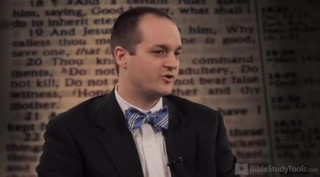
- Recent Translations
- All Translations
Jude 1:11
Share
Settings
Jude 1:11 Meaning and Commentary
Woe unto them
This may be considered as a commiseration of their case, or as a denunciation of deserved punishment, or as a prediction of what would befall them. The Arabic version prefaces these words with an address to the saints, "O my beloved": that what was about to be said might be attended to, as a caution and instruction to them.
For they have gone in the way of Cain;
which was a way of envy, for Cain envied the acceptance of his brother's gift, and that notice which the Lord took of him; so these men envied the gifts bestowed on Christ's faithful ministers, and the success that attended their labours, and the honour that was put upon them by Christ, and that was given them by the churches; which shows, that they were destitute of grace, and particularly of the grace of charity, or love, which envies not, and that they were in an unregenerate estate, and upon the brink of ruin and destruction. Moreover, the way of Cain was a way of hatred, and murder of his brother, which his envy led him to; so these men hated the brethren, persecuted them unto death, as well as were guilty of the murder of the souls of men, by their false doctrine: to which may be added, as another of Cain's ways, in consequence of the former, absence from the presence of God, or the place of his worship; so these men separated themselves, and went out from the churches, forsook the assembling together with them, and so might expect Cain's punishment, to be driven from the face of God; yea, to be bid go as cursed into everlasting burnings:
and ran greedily after the error of Balaam for reward;
Balaam's error, which he himself was guilty of, was covetousness, or an immoderate love of money, ( 2 Peter 2:15 ) ; which, as it is the root of all evil, is the bane of religion, and the source of heresy, and what the false teachers were greatly addicted to; and where it prevails, it is insatiable, and not to be checked and stopped, as in these men; and is a damnable sin, and excludes from the kingdom of heaven, as well as is dishonourable to religion; hence such particular notice is taken of it, lest it be found in a minister of the word: this character exactly agrees with the followers of Simon Magus. The error which Balaam led others into, was both idolatry and adultery, ( Revelation 2:14 ) , which these false teachers were both guilty of themselves, and taught others, and indulged them therein; and which both teachers and people ran greedily after. Balaam is one of the four private persons, who, according to the Jews, shall have no part or portion in the world to come F23.
And perished in the gainsaying of Core:
the same with Korah, ( Numbers 16:1 ) . The Septuagint there call him Core, and so does Philo the Jew F24, as the apostle does here, and by Josephus he is called F25 "Cores": now the gainsaying or contradiction of these men was like Korah's; as his was against Moses, the ruler of the people, so theirs was against magistracy, ( Jude 1:8 ) ; which was gainsaying God's own ordinance, and a contradiction of that which is for the good of men; the ground of which contradiction was love of liberty, and their own lusts; and, generally speaking, men perish in their factions and rebellions against good and lawful magistrates: also, as Korah gainsayed Aaron, the priest of the Lord, so these men contradicted and opposed the ministers of Christ, whom they would have thrust out in order to put in themselves, and whose persons they reviled, and contradicted their doctrines, which to do is of dangerous consequence; and they might be said to perish in his gainsaying, as a type and example of their destruction, which would be swift and sudden, as his was; and to denote the certainty of it. So the Jews F26 say of Korah and his company, that they shall never ascend, or rise up and stand in judgment, and that they shall have no part or portion in the world to come F1.
F23 Misn. Sanhedrin, c. 11. sect. 2.
F24 De Profugis, p. 471.
F25 Antiqu. l. 4. c. 2. sect. 2.
F26 Misn. Sanhedrin, ib. sect. 2. Yalkut Simeoni, par. 2. fol. 89. 3. Sanhed. ib. sect. 3.
F1 T. Hieros. Sanhedrin, fol. 29. 3.

